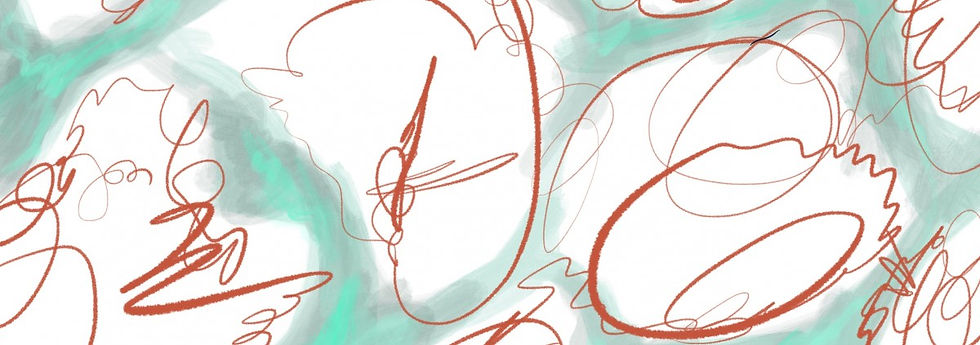a description of water
- Angelina Castellini

- Dec 13, 2021
- 4 min read
Updated: Aug 9, 2025
Be like water
~
~~
~~~

Photo by Victor Serban on Unsplash
"Be like water" is a popular Taoist quote generally attributed to Bruce Lee as he spoke about the essence of Kung Fu:
water
~ soft in nature, formless, and adaptable ~
can penetrate the hardest substances in the world.
How one practices Kung Fu can be a description of water.
What do I mean by that?
A recent assignment on our Warm Data In Your Elbows course with Nora Bateson and the International Bateson Institute is to make a description of water without it being "about" water.
I understand this to mean at least three things:
~ To not resort to textbook descriptions of water such as: water is made of the elements Hydrogen and Oxygen, it is wet, and I can drink it.
~~ To let the description itself have the properties of the water I am describing.
~~~ To notice how my perception of water influences my description and how this might shape mine and other people's understanding of what water is.
I say 'at least' because there's a already a fourth one here for me now:
~~~~ To ask how, for example, a seagull is a description of water. How does a seagull teach us what water is? How does a tree? A desert?
This post, similar to "How is Warm Data changing my everyday life?" is a reworked version of pieces which I produce as part of the course I am taking. I am adding them here because in our workshops and training sessions we might find ourselves doing similar activities. You may have also noticed our reference to water with our Drop-in to Impro sessions.
My first idea for a description of water was this one:
Describing water by the key of its resonance to me is fascinating. I've always loved these sounds ever since my father showed me how to make the glasses sing.
How amazing, that we are able to tell roughly how much water is flowing by the sound it makes when it comes into contact with surfaces: a trickle stream sounds very different from a waterfall, a wave on a quiet summer day is easily distinguished from one during strong north wind.
Notice how we are now talking about our perception of water.
~ Can you see the water ~
~~~~ feel the water? ~~~~
~~taste/smell the water? ~
How does the comparison of sensing different types of water help you understand water?
Using my listening sense to perceive water feels very different from thinking about what water might sound like.
How is this relevant to improvisation and impro studio?
Remember a time where you were doing something
...
and now a time when you were talking about doing this.
...
What's the difference?
To me, this is highly relevant to creative relating because so often I find myself imagining or thinking about how I could be creative rather than doing a creative action.
For example, I might imagine how I would like to work with clay now. I'm thinking about it, imagining my hands moulding the cold, moist earth... but not doing it.
I come up with lots of other things to do instead
and the longing remains ~~~
How many times have you talked about how you would like to be more spontaneous, creative, or loving?
How you'd like to experience 'flow?'
You might talk about how much better your life would be and then switch to an array of reasons why you cannot to this right now
~~~ to be like water.
How is the absence of creativity a description of creativity? In order to know that water is wet, we need to know dryness. To understand flow, we must learn of restriction.
At impro studio, we practice improvising by speaking from our direct experiences, not just 'about' them. We explore structures such as rules and scripts, as well as freedom when we let go of said protocols.
This is also how we aim to share as hosts, trainers, and facilitators: making our holding of space a description of improvisation itself. Every aspect of our being together has the possibility to teach us what it means to be in creative relation.
Shunryu Suzuki writes in Zen Mind, Beginner's Mind:
"Actually water always has waves. Waves are the practice of water. To speak of waves apart from water or water apart from waves is a delusion. Water and waves are one. When you understand your mind in this way, you have security in your feeling." - Shunryu Suzuki
I relate to Shunryu Suzuki's quote here in the sense that life always is improvisational. Improvisation is the practice of life. To speak of improvisation apart from life or life apart from improvisation is a delusion. Life and improvisation are one. When you understand your mind in this way, you have security in your feeling.
I have been practicing Tai Chi on and off for almost a decade and it has only been this year that I have felt the warm flow of energy rush through me in a way that could be described like water.
~ Just for a short moment ~
until I notice another blockage in my body.
It is tempting to speak from a place of 'knowing what is supposed to be happening' or 'abouting.'
At impro studio, I continue to practice noticing and naming what is actually happening. Because as the saying by Heraclitus goes:
~ You cannot step into the same river twice ~


Comments